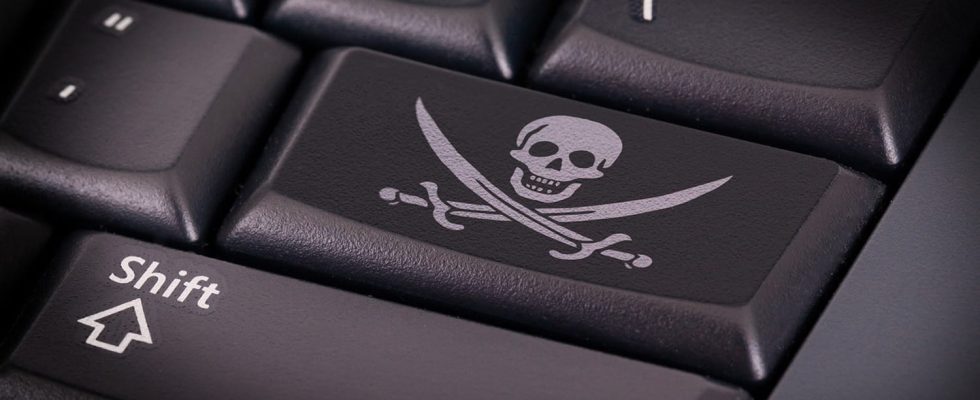Resulting from the merger between Hadopi and the CSA, Arcom actively fights against the piracy of works and content protected by copyright or distribution rights. And suffice to say that she faces many challenges!
The Regulatory Authority for Audiovisual and Digital Communication (Arcom) is actively engaged in the fight against pirate streaming sites, which allow you to watch films and series broadcast by legal platforms without paying, and IPTV, a completely illegal practice which mainly concerns the retransmission of sports matches – particularly football (see our article). A task that is far from easy, given the ingenuity of pirates and Internet users!
As a reminder, Arcom (merger of the CSA and Hadopi, well known to Internet users) was born on January 1, 2022. This new regulatory authority has, compared to the former CSA (Conseil supérieur de l’audiovisuel ), a scope of intervention extended to digital. For Internet users, this means that this new entity’s mission is to better monitor what is happening online while remaining faithful to the founding principle of the CSA which consists of “to be the guarantor of freedom of communication”. “Arcom will make it possible to better address the audiovisual issues of our time, taking into account streaming platforms and major digital players”, declared in an interview with AFP, Roch-Olivier Maistre, new president of Arcom and former president of the CSA. In practice, Arcom takes care, in accordance with the law of October 25, 2021of the question of “protecting access to cultural works in the digital age”that is to say in fact that it will be responsible for fighting against piracy (and in particular against IPTV services and illegal streaming sites used by Internet users to watch films or sports broadcasts), in establishing, in collaboration with rights holders and event organizers, blacklists of the sites and services concerned.
“We will no longer be obliged to go through formal notices”, Frédéric Delacroix, general delegate of the Association for the Fight against Audiovisual Piracy, was interviewed at the time by Le Monde. In this domain, a service hosted on the Arcom website already allows Internet users to search for sites or services with legal offers available online and to suggest new ones to reference. It is also possible to install an extension directly on your Web browser (inherited from Hadopi) called EOL (for Legal Offer Extension) to automatically identify the services referenced by Arcom as being respectful of copyright.
Arcom also supervises the activity of major SVOD platforms (such as Netflix, Disney+, Prime Video, Apple TV+, etc.), works for the protection of minors on the Internet and also exercises its authority over social networks and more. generally on online sites (including discussion forum sites) with at least 5 million unique visitors per month. The objective here being, by imposing an obligation of means (and not of results), on the actors concerned (such as Twitter, Facebook, Instagram or YouTube) to deal with the dissemination of false information and hatred online. If the scope of Arcom is extended compared to that of the former CSA, the resources allocated remain identical for the moment, Arcom having an annual budget of 46.6 million euros and 355 employees.“I will ask for around ten additional hires as part of the 2023 finance law”declared its president, Roch-Olivier Maistre.
But P2P (Peer-to-Peer or peer-to-peer) downloading, most often via torrents, is (almost) no longer in use and has instead given way to DDL (Direct Download or direct download, via services online file sharing), Arcom integrates into its prerogatives a whole arsenal of legal tools aimed at drying up the market for illicit streaming sites, Internet television offers (IPTV) but also mirror sites containing all or part of the services covered. Concretely, at the request of the rights holders and in the event “attacks severe and repeated to the right of audiovisual exploitation”, Arcom can establish blacklists of sites for which it can request blocking from Internet access providers, domain name operators and social networks, and de-referencing from search engines and site directories. . By extension, the establishment of these blacklists can also contribute to demonetizing certain criminal sites by placing banking players and advertisers in particular accountable.
But that’s not all, a so-called dynamic injunction mechanism also makes it possible (even as a preventive measure) to fight against the appearance of mirror sites containing all or part of the content of sites already blacklisted. “The idea is to allow rights holders, whether professional leagues or broadcasters, to be able to act upstream, by requesting a dynamic order from the judge, to identify and publicize the sites on which there is a retransmission The order will be valid for a period of twelve months, and will therefore make it possible (…) to also notify mirror sites, which would appear in duplication after the blocking of certain sites., underlined Cédric Roussel, LREM deputy for Alpes-Maritimes. Arcom has become “the trusted third party to whom rights holders will be able to turn. This is why this order is dynamic, it makes it possible to fight against sites already identified, and mirror sites.” With such a provision, the bet that is made is the one that consists ultimately to cut (but is this really realistic?) the flow offered by the IPTV boxes to which many Internet users clandestinely subscribe, using the excuse of no longer being able to pay all the necessary subscriptions to the SVOD platforms and to the operators holding the broadcasting rights to their favorite football matches. However, there is no system of transactional fines in the law (which can reach several hundred euros). This would have made it possible to target natural persons (i.e. Internet users) at the last stage of the warnings of the graduated response mechanism.
